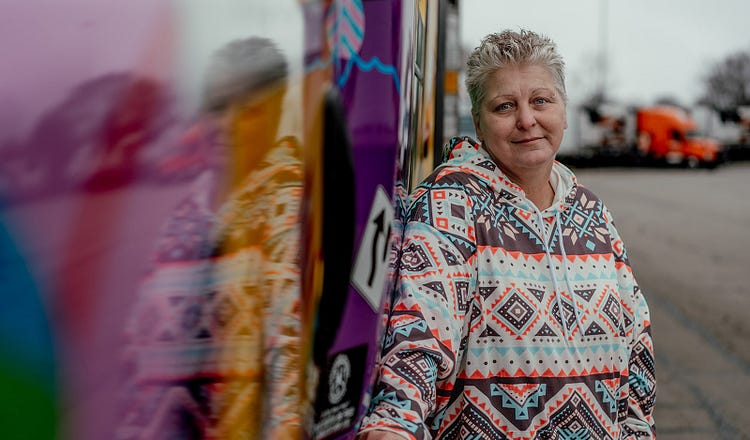
In 2016, when “everything was broken,” truck driver Shelle Lichti voted for Trump. Didn’t matter that she was a lesbian, that she drove a Pride-themed rig called the Rainbow Rider with her three-and-a-half-pound chihuahua, Zulu, in the passenger seat. Trump seemed to get it. But once he was in office, he was “like a child throwing a temper tantrum.” In 2020, she voted for Joe Biden, who she called a “seat-filler.” Since then, she’s been floating. She hated MAGA, but she didn’t think Democrats got why MAGA had happened in the first place, which exacerbated all the anger that had fueled Trump.
“We’re so angry now, we don’t see anything else,” Lichti, 52, told me over the phone last month from Oregon. “Everyone is so tired. They’re trying to figure out how to divert this train from the tracks they’re currently on—from Trump’s neuroticism and narcissism, the ripping down of government, the tearing down of other people, this fatigue everyone is feeling.”
That’s why Lichti cast her vote early for Kamala Harris in the state of Missouri. “I don’t really know her,” she admitted. “Does anyone?” But Harris isn’t Trump, and she said nice things about America and everyone getting along, and that seemed like a start, Lichti said.
“I decided to vote for her pretty much as soon as that option became available, as soon as a definitive person was put forth,” she told me.
America is said to be fatigued by the endless campaign cycle of 2024—which actually started in November 2022, when Donald Trump announced his reelection bid. But many Americans I’ve spoken to over the past few days say they are eager to cast their ballots.
That’s evidenced by the fact voters are turning out in greater numbers than ever at the polls. So far, 78 million have cast early ballots—just over half the total number who took part in the 2020 election. In the swing states of North Carolina and Georgia, which were hit hard by Hurricane Helene, voting is at record numbers. Ditto in the battleground state of Michigan.
But amid all of the voters’ swells of emotion, there is also a great deal of confusion—about who or what, exactly, they’re voting for.
In January, I reported on “The Great Scramble” enveloping American politics: It was unclear what liberal or progressive or conservative or Republican or Democrat meant anymore. Which boxes we belonged in.
Now that it’s Election Day, The Free Press went back to several characters, such as Lichti, who we’ve featured over the past election cycle and asked who they’re voting for. Many had run headlong into the tumult of identity politics, and even been frozen out or punished for their beliefs. Others were part of the messy middle who felt neither party represented their values.
Here’s a snapshot of what they said:

